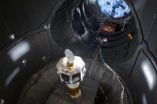(Press-News.org) Key components of the ESA-led Mercury mapper BepiColombo have been tested in a specially upgraded European space simulator. ESA's Large Space Simulator is now the most powerful in the world and the only facility capable of reproducing Mercury's hellish environment for a full-scale spacecraft.
The Mercury Magnetospheric Orbiter (MMO) has survived a simulated voyage to the innermost planet. The octagonal spacecraft, which is Japan's contribution to BepiColombo, and its ESA sunshield withstood temperatures higher than 350°C.
This is a taste of things to come for the spacecraft. BepiColombo will encounter fully ten times the radiation power received by a satellite in orbit around Earth and, to simulate this, the Large Space Simulator (LSS) at ESA's ESTEC centre in the Netherlands had to be specially adapted.
Engineers talk about the power of the Sun in units called the solar constant. This is how much energy is received every second through a square metre of space at the distance of Earth's orbit.
"Previously, the LSS was capable of simulating a solar constant or two. Now it has been upgraded to produce ten solar constants," says Jan van Casteren, ESA BepiColombo project manager.
The improvements have been achieved in two ways: the lamps from the simulators are being used at their maximum power and the mirrors that focus the beam have been adjusted.`
Instead of producing a parallel beam of light 6 m across, they now concentrate the light into a cone just 2.7 m in diameter when it reaches the spacecraft. This creates a beam so fierce that a new shroud with a larger cooling capacity had to be installed to 'catch' the light that missed the spacecraft and prevent the chamber walls from heating up.
BepiColombo consists of separate modules. The MMO will investigate the magnetic environment of Mercury. It is kept cool during its six-year cruise to Mercury by the sunshield. These are the two modules that have now completed their thermal tests.
"The sunshield test was successful. Its function to protect the MMO spacecraft during the cruise phase was demonstrated," says Jan.
Once at Mercury, most of the Sun's fearsome heat will be prevented from entering BepiColombo by special thermal blankets. They consist of multiple layers including a white ceramic outer layer and several metallic layers to reflect as much heat as possible back into space.
"The tests allowed us to measure the thermal blanket's performance. The results allow us to prepare some adjustments for the tests of the Mercury Planetary Orbiter next year," says Jan.
In addition to enduring temperatures of 350°C, ESA's Mercury Planetary Orbiter (MPO) will go where no spacecraft has gone before: down into a low elliptical orbit around Mercury, of between just 400 km and 1500 km above the planet's scorching surface.
At that proximity, Mercury is worse than a hot plate on a cooker, releasing floods of infrared radiation into space. So, the MPO will have to deal with this as well as the solar heat. The MPO begins its tests in the LSS in the summer.
INFORMATION:
ESA's Mercury mapper feels the heat
2011-01-19
ELSE PRESS RELEASES FROM THIS DATE:
Discovery of a gene associated with a leukemia mostly affecting children
2011-01-19
Montreal, January 18, 2011 – Cyndia Charfi, a Ph. D student in biology at Université du Québec à Montréal (UQAM), supported by her thesis supervisors, Professor Éric Rassart, and Adjunct Professor Elsy Edouard, UQAM, Department of Biological Sciences and BIOMED Research Centre, made a major breakthrough in research on B-cell acute lymphocytic leukemia, a disease that occurs most commonly in children. She has successfully identified a gene that may facilitate the diagnosis of this cancer, which is characterized by an abnormal proliferation of B-cells, antibody-producing ...
Keeping your digital secrets safe
2011-01-19
Privacy in the digital age is a sensitive issue for both governments and individuals, as recent news about WikiLeaks and Facebook proved. A new research project at Tel Aviv University may better educate citizens of the virtual world about their privacy -- and even help Facebook users avoid truly embarrassing moments.
It's all about fine-tuning privacy settings based on user information and behavior, says Dr. Eran Toch of Tel Aviv University's Iby and Aladar Fleischman Faculty of Engineering. His software solution, Locacino, is based on better security design, and provides ...
Adolescents with severe mental disorders have never received treatment
2011-01-19
18 January 2011 - A recent study by Merikangas and colleagues published in the January 2011 issue of the Journal of the American Academy of Child and Adolescent Psychiatry (JAACAP) shows that only half of adolescents that are affected with severely impairing mental disorders ever receive treatment for their disorders.
The researchers found that approximately one third of adolescents with any mental disorder received services for their illness (36.2%). Disorder severity was significantly associated with an increased likelihood of receiving treatment, yet only half of ...
NIH-funded study uses new technology to peek deep into the brain
2011-01-19
Changes within deep regions of the brain can now be visualized at the cellular level, based on research on mice, which was funded by the National Institutes of Health. Published Sunday in Nature Medicine, the study used a groundbreaking technique to explore cellular-level changes over a period of weeks within deep brain regions, providing a level of detail not possible with previously available methods. The study was supported by the National Institute on Drug Abuse (NIDA), the National Cancer Institute, and the National Institute of Neurological Disorders and Stroke.
Researchers ...
Why do the Abbotts wait, while the Zimmermans rush to buy?
2011-01-19
The first letter of our childhood surname determines much about our consumer behavior as grownups, according to a new study in the Journal of Consumer Research.
Why are some people more likely than others to wait in line overnight to buy a just-released book or to queue up for the new iPad? "The tendency to act quickly to acquire items such as those above is related to the first letter of one's childhood surname," write authors Kurt A. Carlson (Georgetown University) and Jacqueline M. Conard (Belmont University).
The authors studied how quickly adults responded to opportunities ...
Do American consumers with low confidence in the government buy American?
2011-01-19
When we don't feel confident about our government, we choose indirect ways of showing support, like buying U.S. based products, according to a new study in the Journal of Consumer Research.
"Today, we can barely watch television for any length of time without hearing about verbal attacks on the government, or a given religion or education system," write authors Keisha M. Cutright (Duke University), Eugenia C. Wu (Cornell University), Jillian C. Banfield (University of Waterloo), Aaron C. Kay (Duke University), and Gavan J. Fitzsimons (Duke University).
The results ...
Obesity in horses could be as high as in humans
2011-01-19
At least one in five horses used for leisure are overweight or obese. It's a condition which can lead to laminitis and equine metabolic syndrome.
The pilot study, carried out by The University of Nottingham's School of Veterinary Medicine and Science, showed that rates of obesity among horses are likely to be just as high as they are among people. The results are published online on Monday 17 January 2011 in the journal Veterinary Record.
The study, by third year veterinary student Helen Stephenson from Lydney in Gloucestershire, assessed the prevalence of obesity among ...
Functional boost for magnetic resonance imaging
2011-01-19
Over the last few years, researchers have used a type of brain scanning, known as functional magnetic resonance imaging fMRI, to help them map changes in blood flow in the brain and to correlate this with thoughts and behavior. A new way to analyze fMRI data, which could improve is reported in the International Journal of Computational Biology and Drug Design.
Scientists have known since the 1890s that changes in blood flow and blood oxygenation in the brain (hemodynamics) are correlated with activity in brain cells, neurons. When a neuron is active it needs more energy ...
Distance may be key in successful negotiations, new study shows
2011-01-19
Adding physical distance between people during negotiations may lead to more mutually beneficial outcomes, according to new research from The University of Texas at Austin.
Psychologist Marlone Henderson examined how negotiations that don't take place in person may be affected by distance. He compared distant negotiators (several thousand feet away) with those who are nearby (a few feet away) in three separate studies. While much work has examined the consequences of different forms of non-face-to-face communication, previous research has not examined the effects of ...
Researchers find vitamin D absorption is diminished in patients with Crohn's disease
2011-01-19
(Boston) – Researchers from Boston University School of Medicine (BUSM) have for the first time shown that reduced vitamin D absorption in patients with quiescent Crohn's disease (CD) may be the cause for their increased risk for vitamin D deficiency. The findings, which currently appear on-line in Inflammatory Bowel Diseases, also showed that the only way to determine absorption efficiency is to perform a vitamin D bioavailability test.
Vitamin D is ingested in the diet as well as synthesized in the skin from UVB
irradiation from the sun. People living in areas that ...

